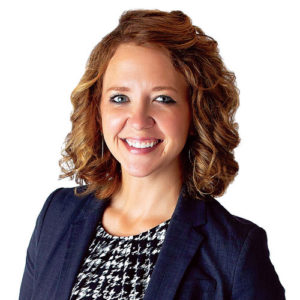
Leaders of several nonprofit skilled nursing providers warned Centers for Medicare & Medicaid Services Administrator Chiquita Brooks-LaSure about the potential impact of “unfunded mandates” and “counterproductive” narratives during a rare direct meeting late last week.
The providers spent much of their time emphasizing the staffing challenges they face and how that inhibits quality. They also asked the administrator to consider the “science of quality improvement” as the agency looks to sharpen its enforcement efforts.
“I’m very glad she was willing to include some of our members in this conversation because they’re on the frontlines and they’re living the reality of the situation we’re in right now,” LeadingAge President and CEO Katie Smith Sloan told McKnight’s. “Our basic message is that we want to work with you on solutions. We agree with the goal of access to consistent, quality care. There are lots of paths to that. We want to build a path forward that rewards and recognizes the good work of good providers, that helps providers that want to improve quality to do so and that closes providers that don’t.”
The virtual meeting took place Thursday between Brooks-LaSure and her staff, Sloan and four prominent LeadingAge members. It follows on the heels of the Biden administration’s announcement of a broad nursing home reform plan.
The provider-members were Danny Williams, president and CEO of Eliza Bryant Village in Cleveland, OH; Jeffrey Farber, CEO of New Jewish Home in New York, NY; Sondra Norder, president and CEO of St. Paul Elder Services in Kaukauna, WI; and Deke Cateau, CEO of AG Rhodes in Atlanta, GA.
Norder challenged Brooks-LaSure to examine existing research on the correlation between leadership turnover and quality as CMS designs its reforms.

“We are incentivized by being supported in providing the best care possible, not by being threatened with million-dollar fines,” Norder told McKnight’s in an email Sunday. “To punish us with exponentially higher fines, additional ‘busy work,’ and public shaming does nothing but cause more leadership and staff turnover through the burnout and financial strain such punishment causes. … The stress that regulatory activity causes leads directly to skilled professionals leaving the LTC sector, and leadership turnover universally leads to instability in quality assurance.”
Norder recommended CMS consider focusing on poorly performing facilities. The agency should help those facilities secure leadership stability as a means to quality improvement. She said the agency also could grant high-performing facilities some reprieve from routine inspections, calling it “a common sense approach to the shared goal we have.”
Sloan noted that agency officials seemed to seriously consider comments on the topic. She said they also mentioned exploring a conceptual “risk-based compliance approach,” although no details were provided during the video conference meeting.
The LeadingAge meeting was the second of its type last week. On Monday, the CMS chief met with Mark Parkinson, President and CEO of the American Health Care Association, and four members of that organization. Representatives of both trade associations also attended a meeting with Health and Human Services Secretary Xavier Becerra on Wednesday.
A funding imperative
In the Thursday meeting, Williams, of Eliza Bryant Village, shared the perspective of a provider working almost exclusively with Medicaid-dependent, inner-city patients — the kind of long-term resident often turned away by others.
“We’ve always been focused on serving the poorest of the poor,” Williams told McKnight’s Friday, adding that his facility has been losing $100 per day per patient, for roughly $300,000 monthly. “My message was if we really care about this population, and we really care about nonprofits who are mission-driven, not profit-driven, we’ve got to do a better job of funding these organizations.”
The tale of Eliza Bryant’s 99-bed skilled nursing unit’s pending closure, he said, was important to illustrate the strain providers are working under as they prepare for broad reform. He told Brooks-LaSure he thinks his community “is the tip of the iceberg” as far as closures if more funding doesn’t surface.
Williams said he understands increased nursing homes payments would need to come from beyond CMS, but he implored the administrator to consider the necessity of funding to support many of the measures reformers appear ready to pursue.
“You can’t give these types of unfunded mandates,” he said. “It’s unethical.”
He also asked Brooks-LaSure to reassess her agency’s approach to enforcement, including how surveys are conducted and the White House’s plan to pursue higher penalty maximums.
“Unscrupulous providers should be held accountable,” Williams told McKnight’s. “But penalizing us when we’re already strapped for cash, that’s not the solution.”
The false narrative
Jeffrey Farber, president and CEO of New Jewish Home in New York, characterized the conversation as “very positive” and described Brooks-LaSure as “remarkably attentive.”
But, like Williams, he wanted to ensure the agency was not painting all providers with the same broad brush.
“Too often, there’s a prevailing notion that we are part of the problem, which is a false, counterproductive narrative that serves no one,” he said in an email to McKnight’s Friday. “We share the administration’s goals of advancing quality and availability of care for older adults, so we should be viewed as the operational extension of that vision since we are out here on the frontlines administering care.”
Along with Norder, he emphasized shifting the regulatory paradigm to promote incentives for improvements in quality of care.
“Help us improve care and services through support, resources, education and dissemination of proven practices,” Farber pleaded with CMS. “There are all sorts of creative ways we can talk about doing that, but that’s where the conversation should be focused, not on bigger sticks, which have proven not to work.”
‘More than lip service’
Sloan said there will be more meetings on the many reform topics now in CMS’ hands. She felt encouraged that the agency was looking for approaches that would be “workable” and achieve intended outcomes.
“I’m encouraged about continuing to work with them, and continuing conversation,” Sloan said. “These are solvable problems, but we need to work together to get there.”
Norder seconded that notion.
“Having a seat at the table felt like more than lip service,” she said. “While neither the administrator nor her staff made us any promises, they certainly validated our concerns anecdotally, so it seems they are seeing the connections between regulatory reform, reimbursement and staffing and how interdependent each of those critical factors is to each other.”




